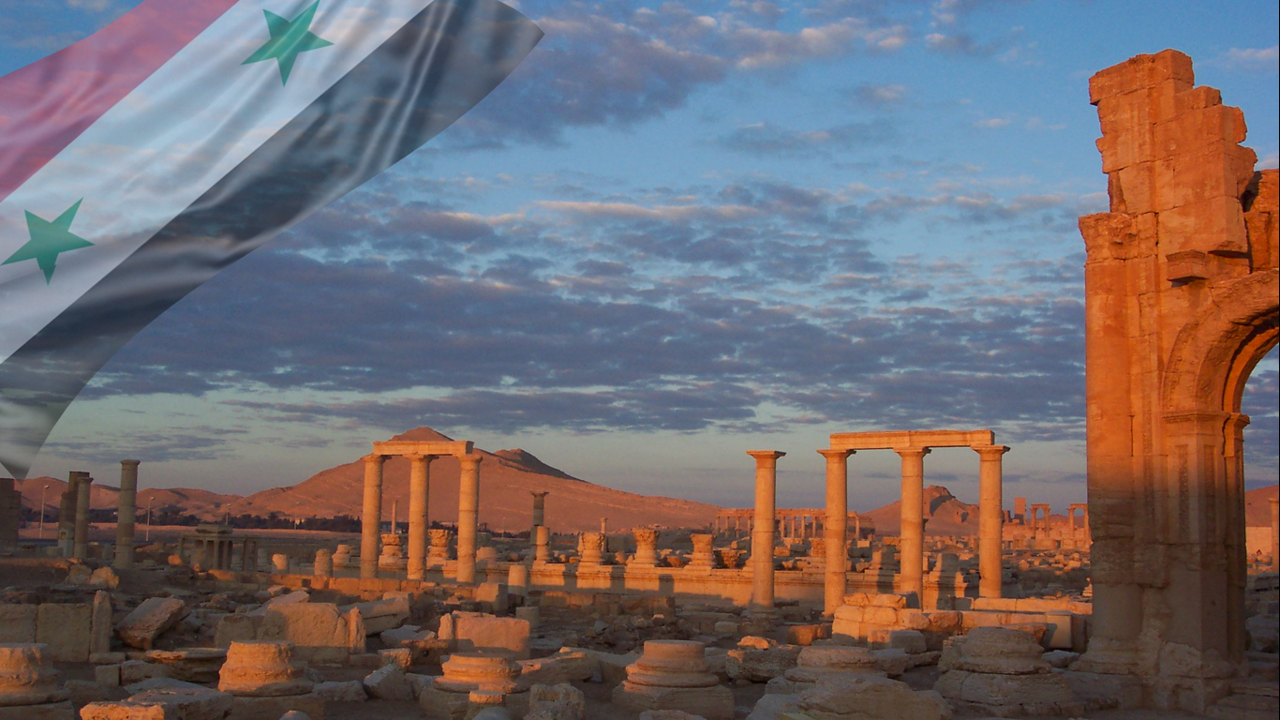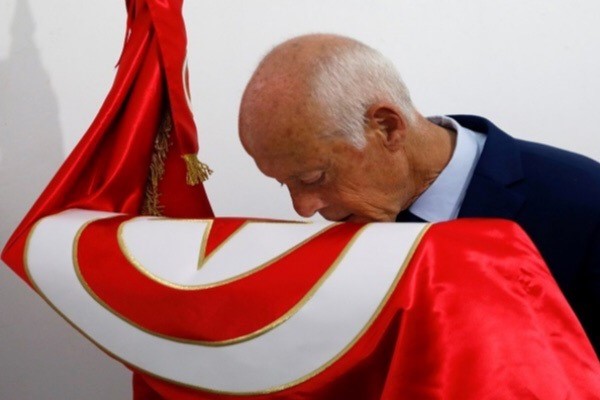Though in the last few weeks the Middle Eastern scenery was loud with the events in the Gulf, in Yemen, and most especially in Syria, big things were happening in the Arab West. Even now, the renewed protests in Lebanon steal the headlines, though the outcome of that wave of protests is still obscure and rightfully concerns many, but in the meantime a real, and even more substantial change happened in Tunisia. After a moth of heated campaigns the North African country witnessed parliamentary and two rounds of presidential elections. And the results are more then puzzling now.
The change in the Carthage Palace is both symbolic and very important for the whole region. Symbolic in the sense that this is the third election after the fall of former strongman, Zayn al-‘Ādidīn ibn ‘Alī in 2011, which lighted the chain of events came to be known as Arab Spring. And since that was the ignition point, and by many viewed as the purest example of the desired democratic change wanted in the Arab world eight years ago, the faith of Tunisia will always rule the understanding of the set of events. Even if all the other pieces of the chain fall very far from the Tunisian example. But the elections were also very important, both for internal and regional points of view.
President Bāğī Qā’id as-Sibsī passed away in the age of 92, and that brought the already scheduled election to November sooner. As the first elections brought the Islamist circles into power in 2011, and the second in 2014 showed a strong dissatisfaction with them, bringing back the old guard, the question was who would win now. The results for the parliament are still puzzling, but for the presidency more than surprising.
Tunisia plays a very important role for a number of reasons. As we already discussed in June, Tunisia was shaken by revelations that the state and the government is constantly edging to build formal relations with Israel. At the same time, as Tunisian security was steadily falling in recent years, which was marked by political assassinations, terrorist attacks against tourists, and even against the security agencies in the capital. That is not a light matter in the region, as Libya is a main concern for all of its neighbors, and has became a battleground for the most prominent regional powers. In that sense Tunisia had a pivotal importance, because were Tunis sink into political chaos, it might have turned into yet another concern for its neighbors. Especially the most influential of them, Algeria, which while also experiencing internal unrest and landslide changes, gained huge inroads in Tunisia’s security. Probably not a coincidence that the newly elected president, Qays Sa‘īd stated even in the campaign that a settlement with Israel equals to grand treason, and the Tunisia will never become irritation or danger for Algeria. The election turned out to be a landslide victory for the democratic process, as an unprecedented number of candidates run for the presidency, bringing an outsider independent to power, and a huge change in the parliament. But will that 61 years old law professor be able to hold this seemingly pro-Arab course, while there is still no government on sight and the political scenery seems to be more fragmented as ever?
From authoritarianism to democracy. The last two elections.
Tunisia was the first to flare up in the Arab Spring in 2010, which brought down the President Zayn al-‘Ābidīn ibn ‘Alī, than already in absolute power for 23 years. Though by now we now that many powers were involved in this change and many of the protests were organized from abroad, the relative fast results and the low number of losses in life, especially compared to Egypt, Yemen, Libya and Syria, put the so called Yasmine Revolution in a romantic light. Even in the Arab world, which after the bitter experiences in Egypt, Libya, Syria and Yemen turned away from the glamour of the Arab Spring, the overall image of the Tunisian revolution never changed.
After a prolonged process as the old guard tried to hold on to power, the elections were held in October 2011, almost a year after the revolution, and brought the landslide victory of Islamist movements. The main winner was the the an-Naḥda, lead by Rāšid al-Ġannūšī, a clearly Islamist party with strong resemblance of the Turkish model of AKP, and the Congress for the Republic (CPR), lead by Munṣif al-Marzūqī, another Islamist party, the local branch of the Muslim Brotherhood. They together already had a majority in the Parliament and their position was further strengthen in December 2011, when the parliament elected al-Marzūqī as president. The new government showed great sympathy for the other Islamist currents than on the rise in the Arab world, most especially in Libya and Syria. But it proved incapable to restructure the state and revive the economy. As by 2014 the experiences in other Arab countries with the Arab Spring turned bitter, steam was running out from the Islamist current and brought a backslash. Two political assassinations hastened the fall of the Islamist rule in Tunisia. The assassination of Šukrī Bil-‘Ayd on 6 February 2013 and that of Muḥammad Braḥīmī on 25 July 2013, both from the People’s Movement, a social-secular party in opposition that time. Both murders were attributed to Islamists activists, who were rumored and widely believed at that time to have had ties with the an-Naḥda. These scandals, which already lead to street clashes, were further aggravated by revelations by the Minister of Interior that time, Luṭfī bin Ğiddū, that certain state authorities were actively involved in the support of young Tunisians joining Islamist terrorists in Syria, even women in a so called “sexual jihad”. By 2014, partially for controversies to revive the constitution, the government already fell apart and new elections were scheduled for October 2014.
The parliamentary elections of 2014 revolved around the question, whether the an-Naḥda can hold on to power, even gain more seats, or the secular-leftist opposition can put a halt to the Islamist progress. The two main contenders were the an-Naḥda and the Nidā’ Tūnis (Call of Tunisia), a patchwork party of former leftist and old guard persons, lead by Bāğī Qā’id as-Sibsī, a former protege of Tunisia’s iconic first president, Ḥabīb Būrqība. While the an-Naḥda fell back considerably, winning almost only in the poorer south, Nidā’ Tūnis scored a huge victory, winning 86 seats out of the 217. In December 2014 as-Sibsī, who held key security positions in the Būrqība era and was even briefly Prime Minister in 2011, even won in the first post-Ibn ‘Alī presidential elections against al-Marzūqī. The newly formed government was a mostly central-secular one headed by the Nidā’ Tūnis, though even supported at the end by an-Naḥda. But the real question was, whether this is a brief interval by the old guard, or birth of a new, more progressive formation, which in time can be an alternative to the already much better organized an-Naḥda. The response came this year, as in the elections on 6 October 2019 Nidā’ Tūnis fell from 86 seats to just 3. Though that was partially due to parties breaking away, and only partially to the lack of real change.
This huge change, and the total collapse of the so far ruling party was due to massive economic and security concerns. If the an-Naḥda-CPR government fell for political assassinations and involvement in the Syrian war, than the Nidā’ Tūnis era was marked by even more shocking terrorist scandals. The government was still fresh and trying desperately to take control of the economy, when on 18 March 2015 three terrorists attacked the Bardo National Museum right next to the Parliament, killing 22 and injuring another 50. Not long after that, on 26 June 2015 another terrorist attack came on tourists at the beach close to the city of Sūsa, killing 38 tourists. Than on 24 November 2015 a bus carrying members of the presidential guards was blown up by a suicide bomber, killing 12 in Tunis. By December that year report suggested that some 7000 Tunisians joined Dā‘iš, most of them from the capital and its broader area and from the south. The situation called all attention to prevent the further escalation and that practically paralyzed the government, as it seemed incapable to put an end to the attacks and the return of the terrorists. An internal report in mid January 2016 perfectly showed how bad is the situation, saying that only between 1 January 2016 and mid January 6 terrorist cells were dismantled and more than 6300 raids were performed. That month huge protests started in the middle of the country, mostly by economic concerns, but the authorities suspected terrorist infiltration. On 22 January retired Major-General Ibrāhīm al-Ḥaddād warned that the situation is desperate and there are huge terrorist infiltrations from both the Libyan and the Algerian borders. His words turned out to be more than correct, as on 28 January 2016 terrorists tried to break in from Libya and clashed with the army, which was proving to be incapable to close the border. Soon terrorists were apprehended in Qayrawān and the army caught weapon shipments crossing from Libya. The situation was so bad that urgent foreign support was needed, and by November even the president acknowledged that American drones were helping to guard the borders. But the much more tangible help came from Algeria, a country rightfully concerned if Tunisia falls into chaos. Algiers already in late 2014 gave $250,000 to the Tunisian security, than sent 12 thousand troops to help guard the border. Algeria heavily lobbied for a deeper cooperation, and in March 2017 the two countries signed a security protocol, which allowed the Algerian services to get more involved in the counter-terrorist activities. How big of a problem was Tunisia for Algeria was clearly revealed in March 2018, when a terrorist cell was apprehended in Algeria, which was smuggling weapons from Turkey via Tunisia and was preparing for attacks.
All in that time the economy was in ruins as in early 2015, but even 2016 the country was shaken by massive protests in all sectors, including the police. By the beginning of 2016 tourism, once one of the main pillars of the economy dropped drastically. And regardless all attempts in January 2016 the government admitted that all former labor programs failed, hastily prompting another until 2020. That was not an easy challenge at all, as European countries heavily pushed the Tunisian government to take back significant numbers of Tunisians. For instance, in January 2016 Germany deemed Tunisia a safe country and started to send back asylum seekers. But that was less than clear, whether only Tunisian would be sent back.
Probably the last straw was the the scandal in June, which revealed that the government already was on the way for a settlement with Israel and that Israeli tourist were freely and legally strolling the Tunisian streets as if those were their own. Yet, the elections this time did not favor the an-Naḥda. It did come out as the winner, but only gained 52 seat, meaning it lost 17 since 2014. The government regained some control by the end of its tenure, but it was clear that deep changes has to come. That was inevitable as the main ruling party, the Nidā’ Tūnis fell apart as main bodies broke away, and its most iconic leader, the president himself passed away.
The parliamentary elections.
By late 2018 it was clear that the Nidā’ Tūnis will not be able to hold on to power, and that hastened factions to break away. It was a clear phenomenon, but the biggest blow came when the president, the biggest name for the party passed away in July 2019. That speeded up the erosion, though it was clear that the 92 old politician would not stand for another term. The biggest winner in this current was a brand new breakaway party, the Qalb Tūnis (Hearth of Tunisia), founded by its leader in June 20, a certain Nabīl al-Qaruwī. Al-Qarūwī also played a major role in the presidential elections, but his faction represented the new business elite within the Nidā’ Tūnis, which was clearly breaking ties with the old elite.
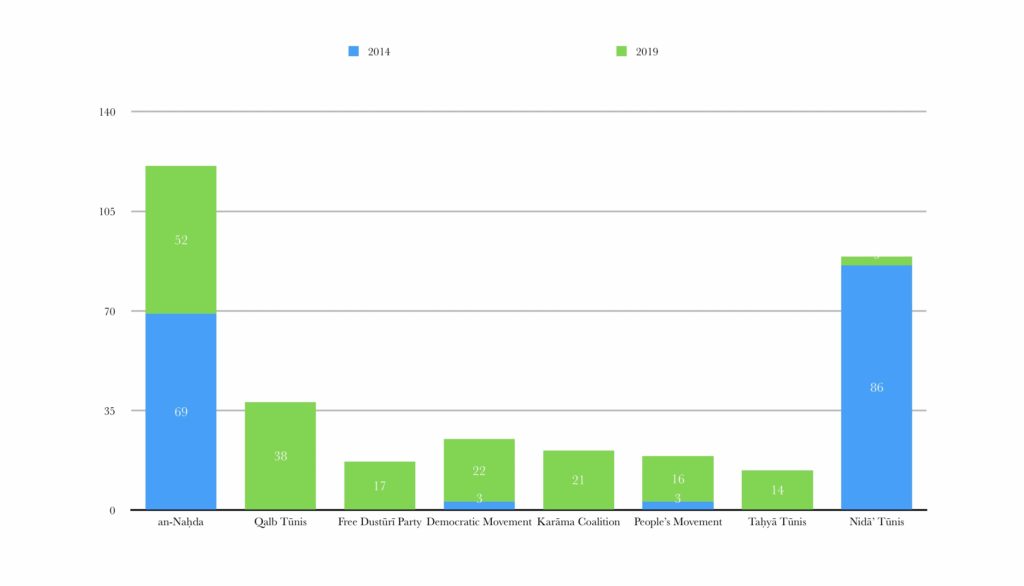
Another major winner was the also newly founded Taḥyā Tūnis (Long Live Tunisia) lead by Yūsaf aš-Šāhid, an agricultural engineer and university professor, who was a Prime Minister since 2016, and heavily fought against the Islamist practices. One of his most famous moves was banning the all-face veils for security concerns in June 2019. His program was a heavily secular-liberal one, mostly a return to the Būrqiba era, and his relative major success proves that the voters not entirely punished the previous government, only it fell apart.
These signs, together with the relative loss of the an-Naḥda would prove that Islamist current is clearly falling back and there has been a nostalgia for the pre-2011 times with more security. Voters favored the new parties and those old ones with clear secular inclinations, like the People’s Movement, which came in sixth in the race. But significant is the relative success of the Free Dustūrī Party (Ḥizb ad-Dustūrī al-Ḥurr) with 17 seats, so finishing fifth, because this 2013 founded party – rebranded in 2016 – is made up by the politicians of the pre-2011 era. So that is in fact the former state-party, which in 2011 was banned from running, and even in 2014 was heavily restricted.
However, Islamism did not entirely lose the favor of the voters. Not only because the an-Naḥda finished as the winner, but because a number of new, more aggressive Islamist formations also performed well. One of them is the Karāma, or Dignity Coalition (I’tilāf al-Karāma), made up in February 2019 by three clearly Muslim Brotherhood branches, the Justice and Development Party, the Reform Front Party (Ḥizb Ğabhat al-Iṣlāḥ), Tunisia’s first clearly Islamist party, and the CPR. While that finished fourth, some other smaller, more conservative formations also got in to the parliament, like the Ḥizb ar-Raḥma (Party of Mercy), or the Current of Love (Tayyār al-Maḥabba), but with much smaller numbers.
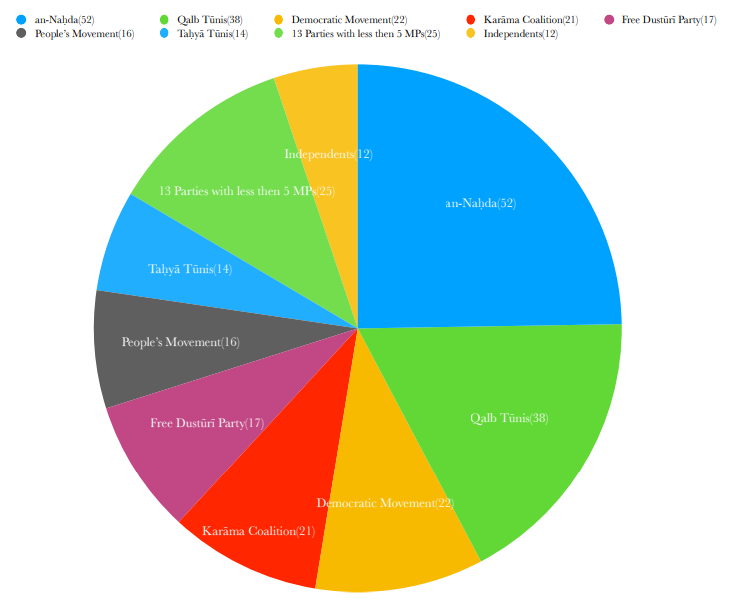
Apart from these a big number of third-way, collective or populist, mostly new formations got in, altogether 20 parties and 12 independent representatives. That is a huge victory for democracy, but now makes the formation of any stabile government very tricky. Islamist forces, even together cannot reach the needed 109 seats from the total 217. But nor the five biggest secular forces together, meaning they would still have to fish for delegates from some of the smaller parties. And they have huge disagreements, as some of them are clearly old-guard formations, while others are representatives of the new business elite. That would indicate a pattern, in which some secular forces join ranks with certain Islamist ones. The an-Naḥda is indeed a potential candidate for such a move, as it supported the previous governments, but with its support steadily falling, it would be a risky thing for any party to join them again. After all, most forces rallied against the Islamist current. Also, in such a broad coalition all parties would race to gain favor on the expanse of the other ones, which would likely paralyze the administration.
The race to form a viable coalition is still fierce and so far we only know little. The Karāma Coalition already announced that it is determined to join the new government, but under no circumstances would be part of it if the Free Dustūrī, or the Taḥyā Tūnis are to be part of it. Naturally they look at the an-Naḥda as their main ally, but price so far seems to be very high. The People’s Movement also expressed willingness to get on board with the an-Naḥda, but they want to nominate the PM and have a number of key ministries on their demand list. It seems that for the time being everyone is charming the an-Naḥda, and so far time is on their side. Being by far the biggest party they are hardly surpassable. And Rāšid al-Ġannūšī is more busy to build his foreign ties, as on 21 October he went to Istanbul to meet Erdoğan, the biggest supporter of his movement, than to tire himself with coalition debates.
Forming this new Tunisian government will surely be a hard task, but keeping any coalition together in the long run will even be harder. Which could have been made easier, were Nabīl al-Qarūwī to win the presidential elections. That would have been his Qalb Tūnis the most influential party in the country, but the voters chose otherwise.
The presidential elections.
If the parliamentary elections were colorful, nothing shorter can be said about the presidential ones. All together 26 candidates were approved, out of them 8 are independent, yet only a few were not backed openly by some major parties. The main parties put their leaders front as candidates. The main exception was the an-Naḥda, which nominated ‘Abd al-Fattāḥ Mūrū, Vice-President of the party, a long time friend of Ġannūšī and a well-known Islamic preacher. The process was somewhat overshadowed by late amendment to the electoral law. The new version aimed to prevent any candidate from running with criminal record, or those who run organizations supported from abroad. Though that might sound reasonable enough, it was widely believed that the aim was to block two candidates specifically, Ulfa Tarrās from a smaller party, and one of the biggest tycoons of Tunisia, Nabīl al-Qaruwī. Which actually did not materialize as he was allowed at the end. After a wide range of televised debates between the candidates, once again an enviable feature of democracy, the first round was held on 15 of September, on which al-Qaruwī came out as second with 15% of the votes. The winner, however, was an independent, Qays Sa‘īd, who first got 18%. They two went for the second run on 13 October, on which Sa‘īd got more than 72%. That is not only significant for his own personality, but by the contender he won against.
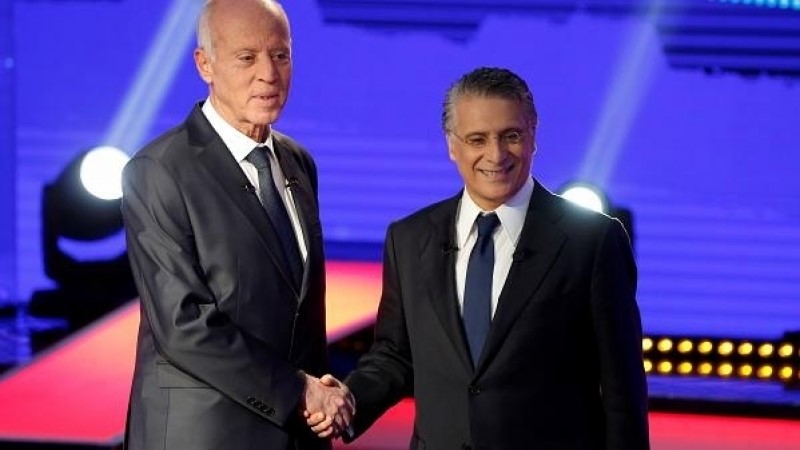
Nabīl al-Qaruwī represents the modern business elite, who started his career in a number of European major companies’ leadership from Palmolive to Henkel, until he moved to the world of media. When he moved back to Tunisia in the early 2000s he founded a set of companies, many of them involved in the media, with outlets all over North Africa. The gemstone of the empire is the Nessma (Nisma – Breeze) tv station, one of the first private ones in Tunisia, and one with the biggest followings. It was set up in 2007 with such partners as Silvio Berlusconi. During the 2010 revolution he used this background to report on the events and support the change, which soon transformed the tv station to an around-the-clock news channel. Soon, however, he found himself at odds with the than rising Islamic current, when his channel aired the famed film Persepolis, a satirical movie about the 1979 Iranian Revolution, which in many parts of the Muslim world was found anti-Islamic. As head of the company he was found guilty and fined, which almost caused him unelectable this summer. He soon joined ranks with the old elite and became a prominent member in Nidā’ Tūnis. When he broke away, he used his media empire to promote his candidacy, and with the huge financial background he was one of the most potential candidate. That made him get to the second round, but as one of the main themes of these elections was corruption and livelihood, the tycoon performed poorly against a modest university professor. Al-Qaruwī is indeed a controversial figure, who made a fortune in the old days, but profited from the new era as well. He has excellent connections with the European political circles, like Berlusconi, but also with the Algerian military elite and allegedly even with the Israeli Mossad. The very personality represents much of what the Tunisians came to hate in the last few years. A wealthy businessman, who tries to buy himself into politics. For his bad luck, his main opponent was nothing like him.
Qays Sa‘īd was a law professor in the University of Tunis, who comes from a humble background, but reached as far as legal expert for the Arab League. Though most of his career would link him to the pre-2011 world, he was never active in politics and never joined any party. He stayed away from the limelight and was relatively unknown until he ran for the presidency this year. He is known to be modest, religious, but secular in views, and a strong supporter of the pan-Arab causes. The scandals in June about a possible normalization with Israel boosted his candidacy, and probably his success has much to do with the fact that no party supported him. As now as well, he shows no sympathy to any party.
Doubtful future.
The huge scatter of votes among the parties, the fact that mostly the new formations gained, while most old parties fell back, and that at the end an old fashioned non-partisan was elected as president all show a general dissatisfaction in Tunisia. The people became tired of the new order and the huge scandals, but so far no new way is shown. The Islamic parties are the most organized, but they as well fail to gain significantly. Even if we add all the votes given to the religious parties the result is still a slight dropping.
It is still yet to be seen what sort of government will be fetched up, or scrap election would be called for for the first time, but it is clear that no strong government is on sight. Which is a concern. Partially because Tunisia became one of the biggest recruiting pools for Islamic terrorism among the countries, which themselves did not fall into chaos. Now with still no peace at sight in Libya and Algeria facing troubles, there is a real fear that Tunisia might flare up once again. That dictates a strong cooperation in the region, for which Qays Sa‘īd is surely the man. After all, he said many times in the campaign that the Algerians and the Tunisians are one nation, divided into two countries. The president, though not head of the government, has major influence on the security matters and the foreign policy, therefore he can do much to stay close to Algiers and avoid encroachment from outside the region, whether from Turkey, the Gulf, or Europe. But with no political stability behind him, will he be able to keep the boat afloat? That is the major question of the upcoming months in the Carthage Palace.

